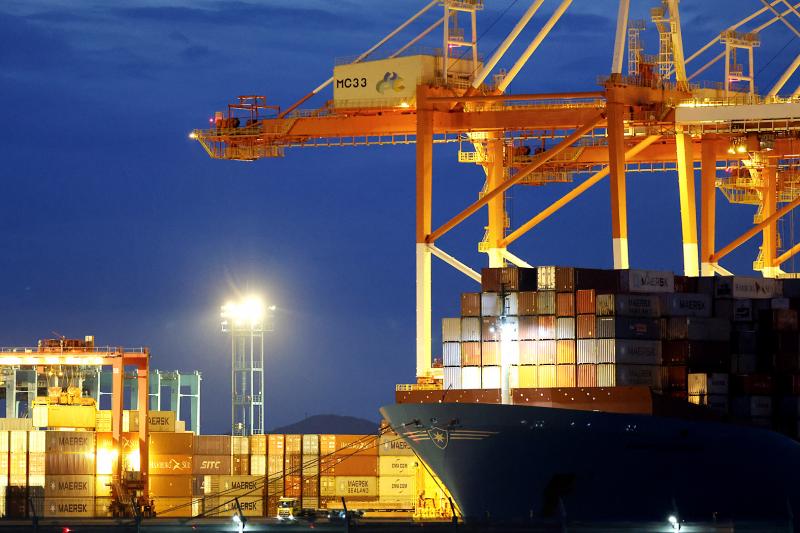Japan’s economy shrank at a 3 percent annual rate in the July to September quarter, as private consumption and auto production took a hit from efforts to curb the COVID-19 pandemic. GDP declined 0.8 percent from the previous quarter, the Cabinet Office said yesterday.
The world’s third-largest economy grew 0.4 percent quarter-on-quarter in April to June and shrank 1.1 percent in January to March.
Japan never implemented a COVID-19 lockdown, but it periodically asked businesses to close or limit hours under “states of emergency.” It has also encouraged social distancing.

Photo: Bloomberg
That crimped consumption and private investment. Private consumption sank 1.1 percent in July to September from the previous quarter, according to yesterday’s data.
A shortage of computer chips and other parts necessary for vehicle production has been a serious problem for months because of lockdowns in chip-producing nations in Asia.
Japanese automakers’ production and sales have suffered, but once restrictions in Southeast Asian countries ease, production is expected to rebound in the months ahead. Toyota Motor Corp, Japan’s largest automaker, said that production is likely to return to normal next month.
The preliminary and seasonally adjusted real GDP data also showed that exports sank 2.1 percent in the July to September period from the previous quarter.
Sumitomo Mitsui Trust Asset Management Co senior economist Naoya Oshikubo said that economic recovery would come once COVID-19 is brought under control.
“The stars are now aligned for a rapid recovery. The state of emergency was lifted at the end of September, so a sharp rebound in consumer spending, with more people eating out and going to cinemas, clubs, theater and other forms of public entertainment, is underway,” Oshikubo said in a report.
Hopes are also high that Japanese Prime Minister Fumio Kishida’s government can pass a supplementary budget within the year to prop up the economy, he said.
Some analysts forecast Japan’s GDP growing in the October to December quarter.

CAUTIOUS RECOVERY: While the manufacturing sector returned to growth amid the US-China trade truce, firms remain wary as uncertainty clouds the outlook, the CIER said The local manufacturing sector returned to expansion last month, as the official purchasing managers’ index (PMI) rose 2.1 points to 51.0, driven by a temporary easing in US-China trade tensions, the Chung-Hua Institution for Economic Research (CIER, 中華經濟研究院) said yesterday. The PMI gauges the health of the manufacturing industry, with readings above 50 indicating expansion and those below 50 signaling contraction. “Firms are not as pessimistic as they were in April, but they remain far from optimistic,” CIER president Lien Hsien-ming (連賢明) said at a news conference. The full impact of US tariff decisions is unlikely to become clear until later this month

With an approval rating of just two percent, Peruvian President Dina Boluarte might be the world’s most unpopular leader, according to pollsters. Protests greeted her rise to power 29 months ago, and have marked her entire term — joined by assorted scandals, investigations, controversies and a surge in gang violence. The 63-year-old is the target of a dozen probes, including for her alleged failure to declare gifts of luxury jewels and watches, a scandal inevitably dubbed “Rolexgate.” She is also under the microscope for a two-week undeclared absence for nose surgery — which she insists was medical, not cosmetic — and is

GROWING CONCERN: Some senior Trump administration officials opposed the UAE expansion over fears that another TSMC project could jeopardize its US investment Taiwan Semiconductor Manufacturing Co (TSMC, 台積電) is evaluating building an advanced production facility in the United Arab Emirates (UAE) and has discussed the possibility with officials in US President Donald Trump’s administration, people familiar with the matter said, in a potentially major bet on the Middle East that would only come to fruition with Washington’s approval. The company has had multiple meetings in the past few months with US Special Envoy to the Middle East Steve Witkoff and officials from MGX, an influential investment vehicle overseen by the UAE president’s brother, the people said. The conversations are a continuation of talks that

CHIP DUTIES: TSMC said it voiced its concerns to Washington about tariffs, telling the US commerce department that it wants ‘fair treatment’ to protect its competitiveness Taiwan Semiconductor Manufacturing Co (TSMC, 台積電) yesterday reiterated robust business prospects for this year as strong artificial intelligence (AI) chip demand from Nvidia Corp and other customers would absorb the impacts of US tariffs. “The impact of tariffs would be indirect, as the custom tax is the importers’ responsibility, not the exporters,” TSMC chairman and chief executive officer C.C. Wei (魏哲家) said at the chipmaker’s annual shareholders’ meeting in Hsinchu City. TSMC’s business could be affected if people become reluctant to buy electronics due to inflated prices, Wei said. In addition, the chipmaker has voiced its concern to the US Department of Commerce